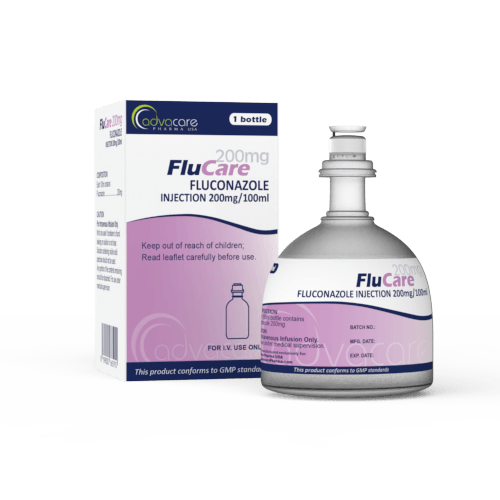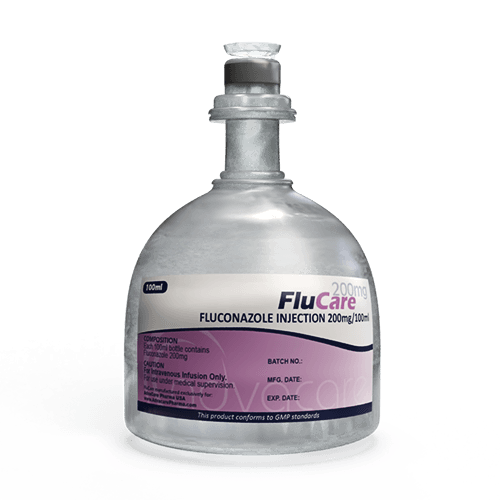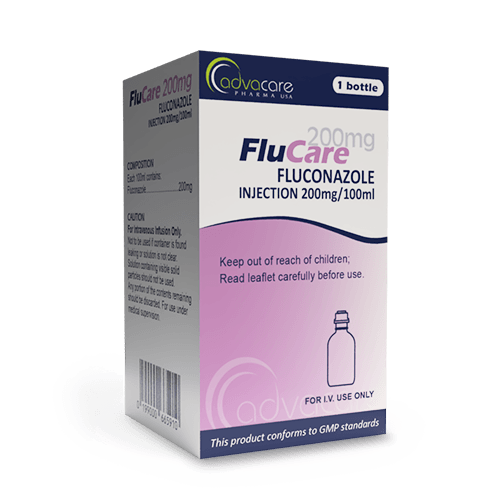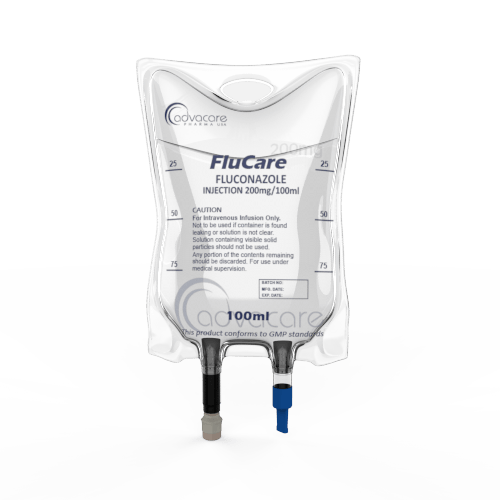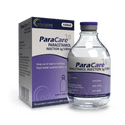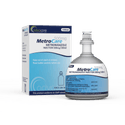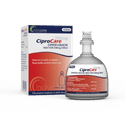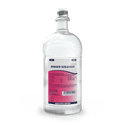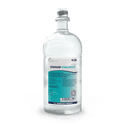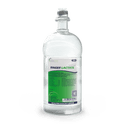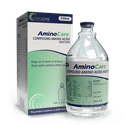- Home›
- Pharmaceuticals›
- Injections›
- Large Volume Injections›
- Fluconazole Injection
Fluconazole Injection
Dosage
Packaging
What is Fluconazole?
Active Ingredients: Fluconazole
Fluconazole Injection is an antifungal drug used to treat fungal infections, such as Cryptococcal meningitis, Coccidioidomycosis, invasive candidiasis, mucosal candidiasis, and chronic oral atrophic candidiasis. This medication is used as a prophylaxis in patients with a high risk of recurrence of certain infections.
Fluconazole Injection is indicated for the treatment or prevention of some fungal infections for newborns, children, and adolescents from 0 to 17 years of age. It is also used for treating adults.
Fluconazole belongs to a class of drugs known as azole antifungals. It is in the subgroup triazole, which is indicated to treat systemic infections. It works by stopping the fungi from producing ergosterol, an essential substance for the fungal cell membrane.
This drug has the potential to penetrate many body fluids, and it is the ideal treatment for many fungal infections. The protein binding of this drug is low and estimated to be 11-12%. This drug is minimally metabolized by the liver.
Fluconazole is primarily excreted by the kidneys, and around 80% of it is excreted as an unchanged drug. Around 11% of the drug is excreted in the urine as metabolites.
This injection has been manufactured as a sterile, single-dose container for intravenous administration.
This drug is also available in the form of capsules.
AdvaCare Pharma is a producer and exporter of Fluconazole Injection. Our supply chain is thoroughly vetted to ensure it meets health, safety, and environmental standards. This medication is manufactured in our GMP-certified facilities in China, India, and the USA.
Why are we a quality Fluconazole manufacturer?
AdvaCare Pharma is a leading manufacturer of Fluconazole Injection. For 20 years, we have been in the business of manufacturing GMP-approved high-quality, affordable pharmaceutical injection products to improve healthcare worldwide. Our control of the supply chain is data-driven and methodical, supported by highly skilled teams of professionals.
As a large-scale Fluconazole manufacturer, we supply pharmaceutical distributors, hospitals, pharmacies and other medical organizations in more than 65 countries.
Uses
What is Fluconazole used for?
It is used to treat fungal infections, including infections of the brain, esophagus, abdomen, lungs, blood, and other organs. This drug is also indicated for the treatment process of oropharyngeal and esophageal candidiasis. It can help in the treatment process of:
- Candida urinary tract infections
- Peritonitis
- Systemic Candida infection (disseminated candidiasis, pneumonia, candidemia)
- Cryptococcal meningitis
This drug can also be used as prophylaxis to decrease the incidence of candidiasis in patients with bone marrow transplantation who receive cytotoxic chemotherapy or radiation therapy. Before adding this drug, it is recommended to perform specimens for fungal culture and other relevant laboratory studies. This should be done to isolate and identify the causative organisms and detect the best therapy for the health issue. This drug can be added even without the results, but after getting the results, the therapy should be adjusted accordingly.
It may be used to prevent recurrent infections in high-risk patients.
How should Fluconazole Injection be used?
This medication is manufactured as a solution, which should only be administered by a doctor or healthcare provider. This drug should be administered intravenously and can be used safely for up to 14 days. It should be administered at a maximum rate of 200mg/hour. This injection should be handled in a sterile way. The drug should be inspected for any discoloration prior to administration. The solution should not be used if the solution is cloudy or precipitated or if the seal is not intact.
What dose should be given?
Recommended dosage guidelines may vary depending on medical condition:
- For cryptococcosis, the usual loading dose for adults is 400mg on the first day, followed by 200-400mg per day. The duration of treatment is typically 6-8 weeks. For life-threatening infections, the dose may be increased to 800mg per day.
- For coccidioidomycosis, the usual dose for adults is 200-400 per day. The duration of treatment is typically 11-24 months. For life-threatening infections, the dose may be increased to 800mg per day.
- For oropharyngeal and esophageal candidiasis, the usual loading dose for adults is 200-400mg, followed by 100-200mg per day. The duration of treatment is 7-30 days or whenever the candidiasis is in remission.
- For prophylaxis of candidal infections, the usual dose is 200-400mg per day. Treatment should begin a few days after the anticipated onset and continue for 7 days after the neutrophil count is at acceptable levels.
- For systemic candida infections, the optimal therapeutic dosage is not well established. Some studies suggest dosing of up to 400mg daily.
- For urinary tract infections and peritonitis, the usual daily dose is 50 to 200mg.
- For prophylaxis in patients with bone marrow transplantation, the recommended dose is 400mg once daily. Patients with severe granulocytopenia should start prophylaxis a few days before neutropenia occurs. The treatment should continue for 7 days until the neutrophil count rises.
The daily dose for infections other than vaginal candidiasis should be based on the infecting organism and the patient’s response to therapy. If the fungal infection is still present, the treatment should be continued until the clinical parameters or laboratory tests are good. Inadequate doses might lead to recurrence of the active infections. Patients with AIDS and cryptococcal meningitis or recurrent oropharyngeal candidiasis need maintenance therapy. This is to prevent relapse infections.
Refer to a doctor or pharmacist for guidelines on dosage. Do not exceed what they advise.
Can Fluconazole Injections be used during pregnancy?
This drug should be avoided during pregnancy except for patients with severe and life-threatening fungal infections. It should be added only if the benefit outweighs the possible risk to the fetus. Spontaneous abortions and congenital abnormalities are possible in women and infants treated during the first trimester of pregnancy.
Can Fluconazole be used during breastfeeding?
This drug can be secreted in human milk in similar concentrations to maternal plasma concentrations. However, some studies show that breastfeeding women who were treated with Fluconazole for lactation-associated candida of the breasts show no serious adverse reactions in infants. This drug should be administered with caution in nursing women and only when needed.
Can Fluconazole be used in pediatric patients?
This drug should be used only in cases of oropharyngeal candidiasis in children from 6 months to 13 years. It should be used for the treatment of Candida esophagitis, cryptococcal meningitis, or systemic Candida infections.
Can Fluconazole be used in geriatric patients?
There are no significant side effects between the older and younger patients due to Fluconazole treatment. Some of the most frequent side effects are rashes, vomiting, and diarrhea. Anemia and acute renal failure are the most frequent in patients older than 65 years of age. This drug is cleared by renal excretion as an unchanged drug. It should be administered with caution in patients with decreased renal function. The dose should be adjusted based on the creatinine clearance.
Other warnings
This drug should be given with caution in patients with liver impairments. There are some cases that show serious hepatotoxicity in patients with serious underlying medical conditions. Hepatic toxicity related to Fluconazole is not related to the duration of the therapy, sex, or age of the patient. This hepatotoxicity can be reversible on discontinuation of therapy. During the treatment process, patients with liver impairments should be monitored. If any serious adverse effects occur due to Fluconazole injections, this drug should be discontinued.
In some rare cases, anaphylaxis is possible if the patient shows hypersensitivity to this drug.
Patients with serious underlying diseases might develop exfoliative skin disorders during the Fluconazole treatment. These patients should be monitored, and the drug should be discontinued if some severe lesions develop. This drug should be discontinued if patients develop superficial fungal infections.
This drug might lead to fetal harm in pregnant women. According to some studies, high doses of maternal Fluconazole might lead to congenital anomalies in infants. If the patients become pregnant during the therapy with Fluconazole, they should inform their doctors and learn about the potential hazard to the fetus. There is also a risk of spontaneous abortion and congenital anomalies in infants whose mothers were treated with Fluconazole during the first trimester of pregnancy.
Side Effects
As with all pharmaceuticals, some unwanted effects can occur from the use of Fluconazole Injection.
Common side effects include, but may not be limited to:
- heartburn
- indigestion
- sour stomach
- change in taste
- upset stomach
Serious side effects may include:
- signs of an allergic reaction
- seizures
- skin rash
- signs of a liver problem
For a comprehensive understanding of all potential side effects, consult a medical professional.
If any symptoms persist or worsen, or you notice any other symptoms, please call your doctor immediately.
Precautions
Do NOT use Fluconazole Injection if:
- You are allergic to it or other azole antifungal drugs.
- You have family history of certain heart problems (QT prolongation in the EKG, sudden cardiac death).
This drug should not be added in patients who showed previous hypersensitivity to Fluconazole or other similar drugs. Patients should inform their doctors if they had some hypersensitivity reactions before.
There is no cross-hypersensitivity reaction between Fluconazole and other azole antifungal drugs, but this drug should be given with caution.
This drug should not be added with other drugs that lead to QT interval prolongation, which are metabolized by the enzyme CYP3A4. This includes pimozide, erythromycin, and quinidine.
Before treatment, consult your doctor regarding any medications you are taking to address potential drug interactions.
This medication may not be suitable for people with certain conditions, so it is important to consult with a doctor if you have any health conditions.
References
Efficacy of Fluconazole Subconjunctival Injection as Adjunctive Therapy for Severe Recalcitrant Fungal Corneal Ulcer
This study focused on assessing the efficacy of 0.2% fluconazole subconjunctival injection as an adjunctive treatment in severe recalcitrant fungal corneal ulcers.
This is a retrospective, non-comparative interventional case series from January 2007 to August 2007. This study involved six patients, each with a severe fungal corneal ulcer that did not respond to topical antifungal drug therapy.
All of the patients were treated with 0.5ml of 0.2% fluconazole subconjunctival injection twice a day as adjunctive therapy for 5 days, then once a day for 14 days.
The results showed that three patients were successfully treated within 14 days, while two patients partially responded; one of them underwent evisceration, and one patient did not respond to treatment and enucleation was done.
The study concludes that 0.5ml of 0.2% Fluconazole subconjunctival injection can be a very useful treatment as adjunctive therapy for severe fungal keratitis, with a few mild complications. This injection is very beneficial in cases of impending perforation or post-operative procedures such as glue application for a ruptured cornea.

You might be interested in...
Why AdvaCare Pharma?
As an industry leader, we are aware of our responsibility to provide affordable and sustainable solutions to improve healthcare worldwide.
